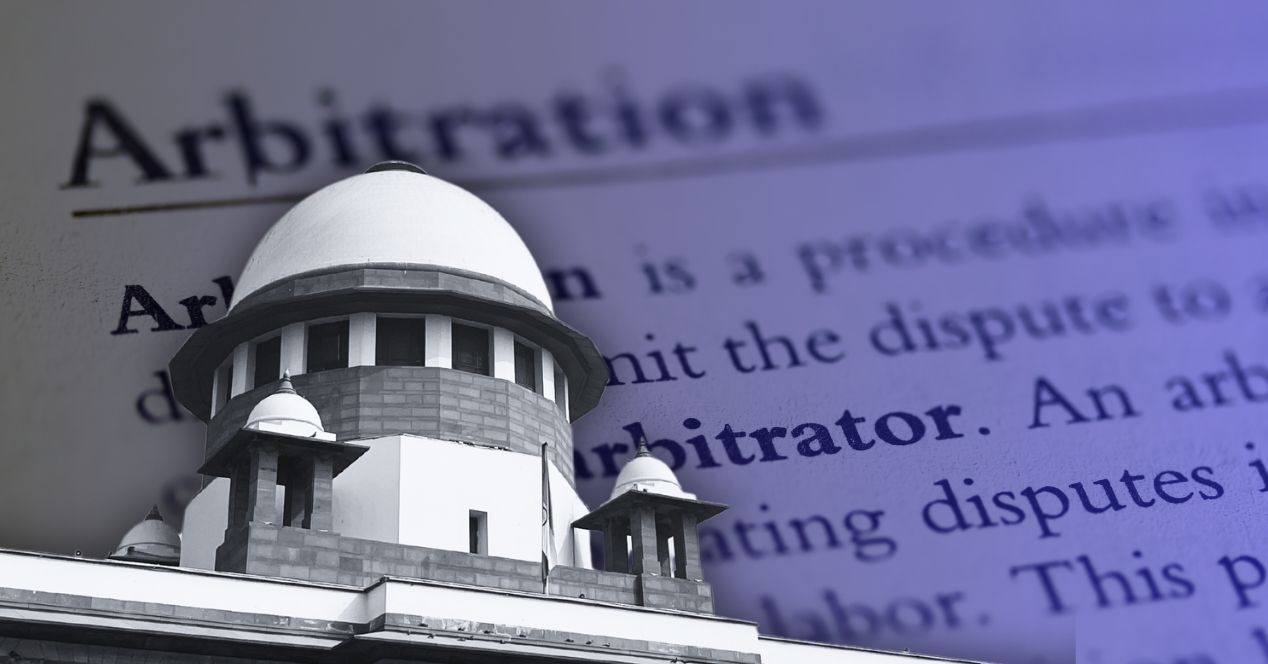Analysis
Equality in public-private contracts: the Supreme Court’s judgment in the CORE arbitration case
The decision invalidating unilateral appointments to arbitral tribunals encourages the government to be a more responsible commercial player

On 8 November 2024, a five-judge Constitution Bench of the Supreme Court delivered a significant decision on issues of law related to arbitration agreements between government authorities and private parties. Specifically, the Court held that clauses which mandate unilateral appointments of an arbitral tribunal were invalid. In this article, we analyse the Court’s judgement and what it means for public-private arbitrations in India.
Government and arbitration
The government of India has had a hot and cold relationship with arbitration.
In 2016, at a conference on the National Initiative on Arbitration and Enforcement, Prime Minister Narendra Modi had stated that the promotion of arbitration was one of the goals of his government. The amendments introduced to the Arbitration Act in 2015 and 2019 aimed to make arbitration more efficient and effective and also to establish new arbitral institutions.
However, while the government, in its administrative and regulatory capacity, has been positive towards arbitration, it has shown the opposite attitude as a litigant. Internationally, India found itself having to pay large sums of money due to adverse awards in investment arbitrations initiated by various entities such as White Industries, Cairn, Vodafone and Devas. At the domestic level, the intransigence of various government bodies in complying with awards passed against them also posed a problem. A special scheme called ‘Vivaad se Vishwas’ was introduced to encourage government entities to pay 65 percent of the amount awarded under arbitration.
This skepticism towards arbitration also shows up in policy measures at times. A recent circular of the finance ministry highlighted several problems with arbitration as a mode of dispute resolution and stated that as a norm, arbitration should be resorted to only in cases where the financial implications were under Rs. 10 crores. The circular expressed reservations around appointment, noting that “arbitrators are not…subject to the high standards of selection which are applied to the judiciary and to judicial conduct.”
Lead-up to the judgment
The selection of arbitrators, especially where the government is a party, has been a sore point. In its 246th Report, filed in August 2014, the Law Commission of India recommended several changes to the Arbitration Act to secure the neutrality of arbitrators. Notably, the ex officio representative of the government sought an exception for state parties, which was not accepted by the Commission.
The Commission’s recommendations resulted in an amendment to Section 12(5) of the Act, which brought in criteria to determine justifiable doubts as to an arbitrator’s independence and impartiality on the basis of the International Bar Association Guidelines.
The change in the legislative landscape crystallised in Supreme Court decisions in Voestalpine (2017), TRF (2017) and Perkins (2019), all of which upheld the requirement of a “broad-based panel” and nullified the appointment of sole arbitrators by an interested party.
Then, in December 2019, the Court in Central Organisation for Railway Electrification v ECI–SPIC–SMO-MCML (CORE), upheld a contractual clause appointing an arbitral tribunal consisting of three retired railway officers from a panel of at least four retired officers provided to the contractor. The Court relied on Voestalpine to observe that Section 12(5) does not bar former employees from being appointed as an arbitrator. It also distinguished TRF and Perkins by holding that the General Manager’s power to appoint an arbitrator was counterbalanced by the contractor’s power to choose two out of the four arbitrators from the panel maintained by the Railways (though the final pick between the two selected would, again, be a Railways pick).
Later, in UoI v Tantia Constructions Limited (2021), a three-judge bench expressed its disagreement with CORE. This bench observed that an ineligible appointing authority cannot make valid appointments and referred the questions to be settled by a Constitution Bench.
The questions that arose for the consideration of the five-judge bench were:
- Whether an interested party can unilaterally appoint a sole arbitrator or curate a panel of arbitrators mandating the other party to select from such list;
- Whether the principle of equal treatment of parties applies at the stage of appointment of arbitrators; and
- Whether a clause permitting a government authority to unilaterally appoint a sole arbitrator or a majority of arbitrators in public-private contracts is violative of Article 14 of the Constitution?
The Constitution Bench’s decision
The overarching consensual view of the Constitution Bench was that in the commercial world, a level playing field for private and public parties was essential at all stages of arbitration. The Court acknowledged that the Arbitration Act mandates arbitral proceedings be held under the grundnorms of “(i) equality of parties; and (ii) independence and impartiality of arbitral proceedings.”
A court that is otherwise polyvocal has been consistent and unanimous on the point of effacing the difference between private and public parties in contracts (in the absence of a separate governance system), as seen in Pam Developments (2019) or even the recent International Seaport Dredging Pvt. Limited (2024).
The majority opinion in CORE (2024), authored by former Chief Justice D.Y. Chandrachud, affirms arbitration as a quasi-judicial function and reiterates that an arbitrator needs to exercise their powers impartially and objectively. The opinion treats the principle of equality found in Section 18 of the Arbitration Act as the basis for the creation of an independent and impartial tribunal.
The majority also relies on the constitutional norms of (procedural) equality found in Article 14 of the Constitution. The majority unequivocally opines that the “independence and impartiality of arbitral proceedings and equality of parties are concomitant principles…equal treatment of parties applies at all stages…including at the stage of appointment of arbitrators.”
In striking down unilateral clauses, the majority emphasises arbitrator bias. It notes that party autonomy continues to prevail under the proviso to Section 12(5) of the Act. The proviso permits express waiver of the disqualification of an arbitrator by either party after a dispute arises.
The Court also held that the counter-balancing referred to in Perkins will work only in situations where arbitrators are appointed in the exercise of genuine party autonomy and not in the case of curated lists like Voestalpine and CORE.
While the judgment delves extensively into the question of bias in administrative law, it is the discussion of the arbitral appointment process in public-private contracts that is most pertinent. The Court conclusively holds that such clauses are void under Section 23 of the Contract Act on the grounds of arbitrariness.
Even as the Court acknowledged that arbitration law is an autonomous legal field, it clarified that it functions within the boundaries prescribed by the State. Here’s what the Court said while concluding that unilateral appointment clauses in public-private contracts are violative of Article 14 and the equality principle in the Arbitration Act:
“Every action of a public authority or a person acting in the public interest or any act that gives rise to a public element must be based on principles of fairness and non-arbitrariness…Further, a unilateral appointment clause is inherently exclusionary and violates the principle of equal treatment of parties and procedural equality.
Unilateral appointment clauses in a public-private contract fail to provide the minimum level of integrity required in authorities performing quasi-judicial functions such as arbitral tribunals…”
In light of the above, the majority upheld TRF and Perkins and disagreed with Voestalpine and CORE. It also clarified that its judgement would apply prospectively.
The dissenting opinions
The minority opinions of Justices Hrishikesh Roy and P.S. Narasimha expressed strong dissents on two counts:
- Importing public law principles from constitutional and administrative law into arbitration, and
- Considering Section 12 and the proviso to Section 12(5) of the Arbitration Act, no a priori declaration that all unilateral appointments are invalid could be made.
Justice Roy held that anchoring the principle of equality in the Arbitration Act alone promotes the ethos of party autonomy and minimal judicial interference. Justice Narasimha held that it would be correct to locate the obligations to constitute an independent and impartial tribunal within the Contract Act [Sections 28 and 23] and the Arbitration Act.
Expected impact
The Union and state governments are the biggest litigators. They are also a party in a large number of arbitrations. An exception carved out for the government would have caused complications in all arbitrations involving it. The clarity that the judgment provides goes a long way in ensuring that arbitrations do not take on a different colour merely by virtue of one party being a government entity.
The judgment, however, leaves open the question of the validity of statutory provisions that mandate the resolution of some claims against the government by arbitration. Such clauses also contemplate government servants as arbitrators. While the challenge to such statutory mandates is yet to be adjudicated, the introduction of principles of equality in the majority view in the recent judgment has sufficient basis to challenge the statutory provisions pertaining to ‘mandatory arbitrations’.
The issues considered in this case may arise once again, as alluded to by Justice Narasimha. Courts will have to consider the practicability of prohibiting all unilateral appointments of arbitrators from a panel. Several public and private institutions may be involved in a large volume of low-value domestic arbitrations. Appointing an arbitrator either by consensus or by approaching the court in each dispute may prove inefficient and unworkable.
One possible solution to this problem might be reliance upon domestic arbitral institutions for routine and low-value disputes. This will not only streamline the appointment of independent and impartial arbitrators for the adjudication of such disputes but will also provide an institutional framework for the conduct of the proceedings.
Lastly, government bodies tend to drag challenges to arbitral awards to the last possible resort before complying with them. It is hoped that the expectation in CORE—of the government being a responsible commercial player—will guide the government in its future conduct.
Hima Lawrence is a dual-qualified attorney (India & New York) and Advocate on Record at the Supreme Court of India. Abhinav Hansaraman is an Advocate in the Supreme Court of India.




